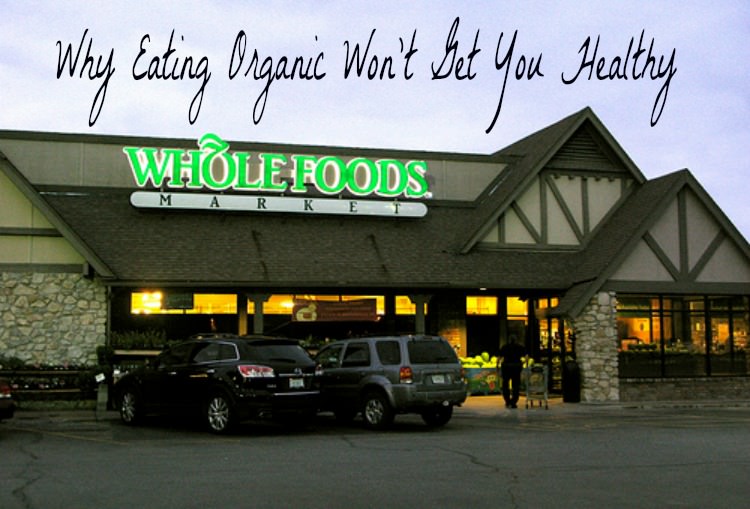
High five!
You’ve made some big changes in your family’s diet recently and are really focusing on eating organic. You’ve stopped buying boxed cereal and other processed snacks at the grocery store and are making homemade snacks and treats with wholesome ingredients instead. You’re even sprouting or soaking nuts and seeds and even your legumes and grains!
You’ve joined an organic fruit and veggie co-op and made the switch to grassfed locally produced meats. You’ve even taken the wise step of incorporating raw grassfed milk into your family’s diet.
While all these changes are wonderful and beneficial compared with how you’ve been eating, I’ve got some tough news for you.
These changes alone are not going to get you healthy.
Eating organic is not the way to health shocking as it may sound!
Gulp.
How can this be, you ask? Your diet is now light years ahead of where it was. How can this organic, whole foods diet not result in vibrant health?
Let me tell you a little story ….
The Telling Tale of the South Sea Islanders
The first Europeans to visit the South Sea Islands in the 1700’s were Captain Cook and his crew. Tahiti was truly a paradise with beautiful people whose frequent smiles revealed perfectly straight, pearly white teeth.
Dr. Weston A. Price found the same blissful environment nearly 200 years later when he arrived with his wife to study these happy, healthy people. Dr. Price noted that the bone structure of the South Sea Islanders was the most perfect of any of the 14 isolated traditional cultures he studied during his travels around the world in the 1920’s and 1930’s which he documented in the amazing book Nutrition and Physical Degeneration.
The traditional diet of the South Sea Islanders was high fat, consisting of seafood and pork with coconut the most important plant based staple. Tropical fruits and other plants were also consumed as there were plenty available in such a temperate and ideal growing climate.
The environment and water were, of course, pristine and food was abundant.
Wouldn’t such an organic, whole foods diet be enough for health?
No, it was not.
The South Sea Islanders knew from observation and perhaps instinct that their clean, whole mixed diet was not enough to maintain their own health or to produce healthy babies and children.
The Sacred Food the South Sea Islanders Could Not Do Without

Despite having plenty of whole, nutrient dense foods available during all times of the year, the South Sea Islanders risked their lives over and over again to hunt sharks.
Once a shark was caught and brought to shore, the liver was removed and put inside the shark’s stomach which was then hung on a tree to ferment.
The oil that came out of the shark liver as it fermented provided a plethora of fat soluble vitamins A, D, and K2 to the South Sea Islander diet that was the critical missing link for vibrant health. This oil was given to growing children and young adults who were about to get married and also to pregnant women. Such oil would have been critical to maintaining health into advanced age as well.
Dr. Price knew from research that the level of fat soluble activators in the South Sea Islander diet was about 10 times higher than the Americans of his day … and processed, devitalized foods had not even arrived in full force yet!
Fat Soluble Vitamins More Important Than Eating Organic
The story of the South Sea Islanders illustrates the critical nature of the fat soluble vitamins in the diet. Without them, no matter how pure, whole and organic a diet may be, health will not be maintained nor healthy children easily produced.
The fat soluble activators A, D, and K2 supercharge mineral absorption into the body tissues and enhance the health and function of every organ system.
Fortunately, fermented cod liver oil and fermented skate liver oil are available today that are very similar to the fermented shark liver oil consumed by the South Sea Islanders.
Please note that the typical brand name fish or krill oil and even cod liver oils on the market are highly processed, industrialized, rancid, deodorized oils that should be avoided. Only fermented cod and skate liver oil is processed with no heat as practiced by traditional cultures.
I have been taking these types of oils for many years and would never consider my whole foods diet complete without them. Why reinvent the wheel and experiment with the latest and greatest silver bullet supplements that seem to change every few months when traditional cultures such as the South Sea Islanders already knew what it took to have healthy babies and stay vibrantly healthy well into old age?
Where to Source Fermented Fish Liver Oils
Please refer to my Resources page for a list of companies that offer clean, purified fermented fish liver oils to provide your whole foods diet with the critical fat soluble activators A, D, and K2.
What to Do if You are Allergic to Fish
If fermented cod or skate liver oil aren’t possible for you due to a seafood allergy, note that you can obtain fat soluble vitamins in other foods valued by other Traditional cultures such as raw, grassfed butter (must be deep yellow to orange in color – sources), fish eggs (many can tolerate fish eggs even with a seafood allergy), emu oil from emus eating their native diet (sources), deep orange yolks from pastured hens, and liver from land based animals.
Sarah, The Healthy Home Economist
Source: Nutrition and Physical Degeneration, Dr. Weston A. Price DDS








I just wrote a comment with the wrong email address. Can a six year old take 1/2 tsp each of cod and skate oil or would that be too much, I am trying to heal cavities.
Can a 6 year old take 1/2 tsp of cod and skate oil? Aim trying to heal cavities!
I think the Quaker company is indeed in the ugly GMO corporate bed, but as to whether or not the rolled oats are actually GMO at this point, I do not know.
I think the Quaker company is indeed in the ugly GMO corporate bed, but as to whether or not the rolled oats are actually GMO at this point, I do not know.
I am appalled by some of the comments to this post. Sarah makes a good point that organic food is not necessarily nutrient dense, and nutrient dense food is necessary for optimal health. Her post is well reasoned and honestly presented. Regardless of whether you agree or disagree, some of the posts are downright disrespectful and nasty, calling Sarah a “silly girl”, saying “you can do better”, and calling her article “disappointing”, among the rest. Sarah’s blog with all of its informative posts and videos has helped to educate thousands of peope, if not more, to the benefits of nutrient dense foods. What have YOU done in comparison? Very little I would guess, especially judging by the character of someone who would throw such insults. Your criticisms do nothing to further the food movement and seek only to cause division among its members. Grow up.
Again – as the commenter above noted – you have such a misleading title for what can be a good post. Why I thought you were jumping on the Dr. Oz bandwagon at first…… which is the only reason I pulled up the post to read. Silly girl, keep your blog content good and you won’t have to lure people to read them with goofy headlines.
There are LOTS of good reasons to eat organic – and eating organic healthy fats is important.
I am disappointed that you would stoop to such a sensationalistic title for one of your posts. Of course anyone who is paying attention realizes that organic junk foods are not healthy. But to put organics and nutrient dense as an either/or proposition is misleading and a disservice to any of your readers who have not experienced the benefits of an organic diet first hand.
My family has slowly been adopting an organic diet over the past 4 years. We originally thought we couldn’t afford to eat organic but wanted to do the right thing for the kids we pass this world on to, so snuck in an organic item or two when they were on sale or close in price to chemically farmed foods. As our income declined, we found that we were more full and more healthy with less food (and less cost overall) when we included more local, organic foods in our diet. We now eat almost exclusively organic and live on less than a third of the average household income. We are happier and healthier than we have ever been in our 40 some-odd years.
Yes, eating the right nutrient dense foods is important. AND so is eating organic foods (which are more nutrient dense than their chemically farmed counterparts).
Please don’t fall into the trap of confusing your readers for the sake of an attention grabbing headline. You can do better.
Raederle do you know is Quaker is on the GMO list?
…and why I advocate eating fish